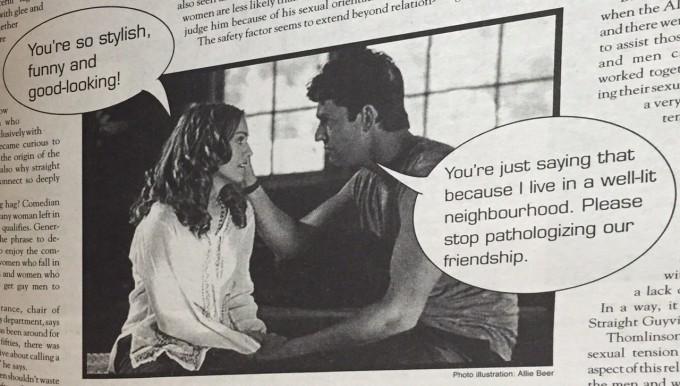By Tamara Robbins
My friend Tiffanie once proposed to a gay man at a wedding. “He was such a good dancer,” she says. “He was intelligent, sensitive and well-dressed. I figured we could still both have our men.” Of course, he declined the offer.
There are plenty of women like Tiffanie who claim the bane of their existence is falling in love with gay men.
When asked to write this article on fag hags, I balked. I had never heard the crude term before. While some women and gay men find the term “fag hag” to be in incredibly bad taste, others use it with glee and nonchalance. Whether the connotations are negative or positive, the definition of this relationship is based on stereotypes.
However, I know plenty of women who hang out almost exclusively with gay men, and I became curious to find out not only the origin of the term fag hag, but also why straight women seem to connect so deeply with gay men.
So what is a fag hag? Comedian Margaret Cho says any woman left in a gay bar at 4 a.m. qualifies. Generally, people use the phrase to describe women who enjoy the company of gay men, women who fall in love with gay men and women who try relentlessly to get gay men to switch teams.
Murray Pomerance, chair of Ryerson’s sociology department, says the term fag hag has been around for decades. “In the fifties, there was something pejorative about calling a woman a fag had,” he says.
It meant that men shouldn’t waste their time going after a fag hag because there was something wrong with her. She either wasn’t interested in men, was gay herself, was asexual or just very, very picky.
Pomerance says even though the term “fag hag” is often donned with pride, it is blatantly homophobic. We give a woman a derogatory moniker because she hangs out with gay men.
George Beilmeir, associate director of the school of social work points out that the concept itself is “pathologizing people.” Still, many women are proud to call themselves fag hags. They feel empowered by reclaiming a term that used to be seen in a negative light.
There is also something to be said for the fact that many of us want what we can’t have: many women pine for jerks while brushing off nice guys who actually like them. There is allure in something unattainable. And for the woman who has survived one too many dysfunctional relationships, it is very “safe” to adore gay men.
“They’ll never break your heart,” says Tiffanie. “You can talk about other men with them. It’s a male perspective without the risk of all the complications that arise when you are friends with straight guys.”
But the relationship between a straight woman and a gay man doesn’t only serve the needs of the woman. Women are also seen as “safe” by gay men. One gay friend said that women are less likely than straight men to ridicule and judge him because of his sexual orientation.
The safety factor seems to extend beyond relationships and into the realm of real estate. More and more women are moving to the rainbow-coloured part of town, where they feel safer and less threatened. The area around Church and Wellesley is well-travelled and well-lit.
“If you’re a single woman looking for a place to live: in terms of safety, it’s hard to beat,” says Ryerson politics professor Neil Thomlinson. “In the time that I lived there, it was noticeable, the change in the makeup of the tenants.”
Another friend, Laura, took to hanging out strictly with gay men during a single period in her life (between several not-so-nice boyfriends). It was clear to me what was going on when Laura started going to Woody’s every other night. If she wasn’t at Woody’s, she was up the street at Wilde Oscars.
She had the funniest, most stylish gay friends. I enjoyed hanging out with them too, but the truth was painfully obvious that Laura was basking in the attention of men who were not going to break her heart. She had been hurt and used one-too-many times by straight men. She wanted to be around testosterone, but not the kind that would drive her to Häagen-Dazs and vodka.
Pomerance puts it this way: “What you’re looking at here is women who really love masculinity, they’re finding what they consider the best example of it.”
John Malone, author of Straight Women and Gay Men, suggests the fag hag phenomenon is largely due to the commonalities shared between women and gay men. Both groups fought to be understood, and therefore feel a connection.
Bielmeier also notes that when the AIDS epidemic began and there weren’t many resources to assist those in need, “women and men came forward and worked together without defining their sexuality and developed a very strong support system.”
There is no doubt that we are living in a culture saturated with overt sexuality. For many women, reaching out and connecting with gay men is about a lack of sexual tension. In a way, it is an exile from Straight Guyville.
Thomlinson say the lack of sexual tension is an appealing aspect of this relationship for both the men and women. If they go out together, he says, “nobody is likely to hit on either one of them.”
The straight woman’s obsession with gay men is a growing phenomenon and the media has taken notice. Movies such as The Object of My Affection, The Next Best Thing, In & Out and the wildly successful television program Will and Grace are indicative of our society’s desire to evolve to a higher level of political correctness while still clinging desperately to many stereotypes.
In my case, I am now able to buy a greeting card that reads “You’re just so fabulous… are you sure you’re not gay?”










Leave a Reply